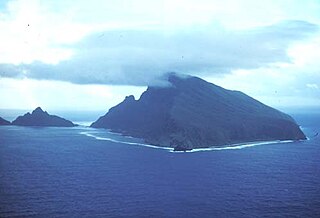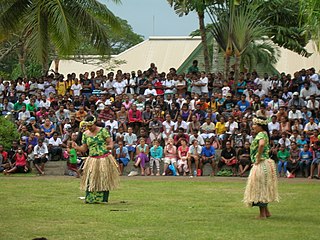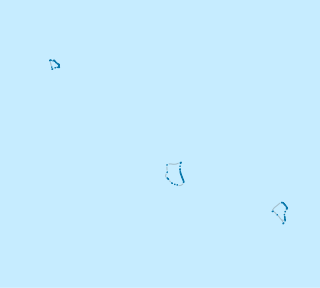Related Research Articles

Tokelau is a dependent territory of New Zealand in the southern Pacific Ocean. It consists of three tropical coral atolls: Atafu, Nukunonu, and Fakaofo. They have a combined land area of 10 km2 (4 sq mi). In addition to these three, Swains Island, which forms part of the same archipelago, is the subject of an ongoing territorial dispute; it is currently administered by the United States as part of American Samoa. Tokelau lies north of the Samoan Islands, east of Tuvalu, south of the Phoenix Islands, southwest of the more distant Line Islands, and northwest of the Cook Islands.

The Samoan Islands are an archipelago covering 3,030 km2 (1,170 sq mi) in the central South Pacific, forming part of Polynesia and of the wider region of Oceania. Administratively, the archipelago comprises all of the Independent State of Samoa and most of American Samoa. The land masses of the two Samoan jurisdictions are separated by 64 km (40 mi) of ocean at their closest points.
Tokelau may refer to:
Tokelauan is a Polynesian language spoken in Tokelau and historically by the small population of Swains Island in American Samoa. It is closely related to Tuvaluan and is related to Samoan and other Polynesian languages. Tokelauan has a co-official status with English in Tokelau. There are approximately 4,260 speakers of Tokelauan, of whom 2,100 live in New Zealand, 1,400 in Tokelau, and 17 in Swains Island. "Tokelau" means "north-northeast".

Atafu, formerly known as the Duke of York Group, is a group of 52 coral islets within Tokelau in the south Pacific Ocean, 500 kilometres north of Samoa. With a land area of 2.5 square kilometres, it is the smallest of the three islands that constitute Tokelau. It is an atoll and surrounds a central lagoon, which covers some 15 km2 (5.8 sq mi). The atoll lies 800 kilometres south of the equator at 8° 35' South, 172° 30' West.

Nukunonu, formerly known as Duke of Clarence Island, is the largest atoll within Tokelau, a dependency of New Zealand in the south Pacific Ocean. It comprises 30 islets surrounding a central lagoon, with about 5.5 km2 (2.1 sq mi) of land area and a lagoon surface area of 109 km2 (42 sq mi). Motuhaga is the only islet that has inhabitants. It has an estimated population of 531.

The politics of Tokelau takes place within a framework of a parliamentary representative democratic dependency. The head of state of Tokelau is King Charles III in right of his Realm of New Zealand, who is represented by an Administrator. The monarch is hereditary, the Administrator is appointed by the New Zealand Minister of Foreign Affairs and Trade.

Swains Island is a remote coral atoll in the Tokelau Islands in the South Pacific Ocean. The island is the subject of an ongoing territorial dispute between Tokelau and the United States, which has administered it as part of American Samoa since 1925. Privately owned by the family of Eli Hutchinson Jennings since 1856, Swains Island was used as a copra plantation until 1967. It has not been permanently inhabited since 2008 but has often been visited by members of the Jennings family, scientific researchers, and amateur radio operators.
In Tokelau a fiafia is a ritualized public social occasion, that comprises an exchange between two or more "sides" of various kinds of "gifts", which need not be material, including skits, theatrical performances, food, money, speeches, and even clowning; but mainly dancing. Fiafia are held at the conclusions of sporting contests, in particular the Tokeluan communal cricket matches, and meetings, on saints days, and during Christmastide; and one common form of such dance is the fatele.

A referendum on self-determination was held in Tokelau on 20 October and on 22–24 October 2007, with the result being that self-governance was rejected. Had it been successful, the referendum would have changed Tokelau's status from an unincorporated New Zealand territory to a self-governing state in free association with New Zealand, akin to the Cook Islands and Niue. However, the referendum required a two-thirds positive vote to pass, and the "yes" side fell short of the required total by 16 votes.

The following outline is provided as an overview of and topical guide to Tokelau:

Foua Toloa was a Tokelauan politician who served as the Head of the Government of Tokelau, or Ulu, from 21 February 2009, to 21 February 2010. He was a member of the Council for the Ongoing Government of Tokelau, and was a faipule on Fakaofo. As the office of Ulu rotates on an annual basis, Toloa resumed office on 21 February 2011. For a time in 2011-2012, he was also Tokelau's minister for Finance, Telecommunication, Energy and Transport.

Tokelau has two official languages: Tokelauan and English. Over 90% of the population speaks Tokelauan, and just under 60% speak English. Also, 45.8% of the population speak Samoan, and small percentages of the population speak Tuvaluan and Kiribati.
The Treaty of Tokehega, officially titled the Treaty between the United States of America and New Zealand on the Delimitation of the Maritime Boundary between Tokelau and the United States of America, is a 1980 treaty between New Zealand and the United States that settles disputed claims and delineates the maritime boundary between Tokelau and American Samoa. The treaty's short name is a portmanteau of Tokelau and Olohega, which the boundary separates.
A fakanau is a traditional Tuvaluan male dance, accompanied by singing and rhythmic clapping.
As prescribed in the Constitution of Tokelau, individual human rights are those found in the Universal Declaration of Human Rights and reflected in the International Covenant on Civil and Political Rights. When exercising these rights, there must be proper recognition of the rights of others and to the community as a whole. If an individual believes their rights have been breached they may go to the Council for the Ongoing Government who may make any appropriate order to protect that individual’s rights. There have been no such complaints to date.
Even Hovdhaugen was a Norwegian linguist. He became a professor of general linguistics at the University of Oslo in 1974. He was an expert in Polynesian languages.

Susana Tetane Lemisio is a community organiser and educator from Tokelau.

Tokelauan people are a Polynesian ethnic group native to Tokelau, a Polynesian archipelago in the Pacific Ocean, who share the Tokelauan Polynesian culture, history and language.

The COVID-19 pandemic in Tokelau is part of the ongoing worldwide pandemic of coronavirus disease 2019 caused by severe acute respiratory syndrome coronavirus 2. Tokelau reported its first confirmed case on 21 December 2022. COVID-19 reached all three of Tokelau's main atolls in July 2023, when the government confirmed the community spread of the virus on Fakaofo, the last atoll without infections.
References
- 1 2 "Kāiga Māopoopo: A Tokelau Conceptual Framework to address family violence" (PDF). The Tokelau Working Group. March 2012. Retrieved 2022-11-10.
- 1 2 3 4 5 "National Policy for Women of Tokelau" (PDF). Government of Tokelau. 2015. Retrieved 2022-11-10.
- 1 2 3 4 Levine, Stephen (2016-06-01). Pacific Ways: Government and Politics in the Pacific Islands. Victoria University Press. ISBN 978-1-77656-026-4.
- ↑ Hoëm, Ingjerd (2004-10-01). Theater and Political Process: Staging Identities in Tokelau and New Zealand. Berghahn Books. ISBN 978-1-78920-423-0.
- ↑ Hoëm, Ingjerd (1995). A Way with Words: Language and Culture in Tokelau Society. White Orchid Press. ISBN 978-974-89272-0-6.
- ↑ Huntsman, Judith; Hooper, Antony (1996). Tokelau: A Historical Ethnography. University of Hawai'i Press. ISBN 978-0-8248-1912-5.
- ↑ "Tokelauan community embraces 'safety at sea' programme". Tagata Pasifika. 2019-11-29. Retrieved 2022-11-10.
- ↑ "Summit for women underway in Tokelau". RNZ. 2019-05-03. Retrieved 2022-11-10.
- ↑ "HOW TOKELAU IS GOVERNED". Government of Tokelau. Retrieved 2022-11-10.